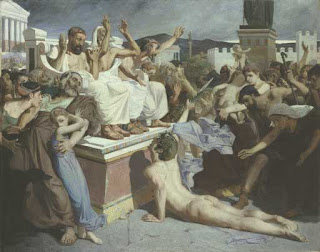Great tale, poor telling. Really, this text should be titled something like 'Several Arguments And Historical Background Making A Case For Marathon As The Battle That Changed Western Civilization.' It was 230 of 260 pages in before he touches on the battle itself! Billows meanders around ancient Greek history leading up to the event, without adding much value or weight to his ultimate thesis. It's only in the last pages that he makes a brief and unconvincing case.
Still, as I say, it's a great tale, and one worth reading about elsewhere. While Billows is correct in identifying Marathon as critically important in shaping the trajectory of Western culture and civilization at the time of its infancy, his absolutist focus on Marathon *alone* seems arbitrary, and poorly argued. Surely, Thermopolae, Salamis and Plataea should be considered part of the same Persian threat; a campaign taking place only a decade later and launched by Darius' son, Xerxes. This is like arguing (with full awareness and satisfaction with the meaty irony here) that Bush The Elder's war on Iraq had no real connection or continuity with Bush The Younger's war on Iraq, and in fact, was the more historically important of the two. Repulsing the Persian advance into Greece was not a one battle affair, and cherry-picking any one as the absolute turning point detracts from the scale and complexity of what the fragmented Greeks managed to (narrowly and repeatedly) achieve when faced with an external threat.
Of course, the battle also spawned the myth of the Marathon run of Pheidippides, who (as the myth goes) ran the distance to Athens to inform the city that the battle was a victory, dropping dead upon delivering his message as depicted in the image below. The reality of his role is actually much more impressive. He ran to Sparta from Athens to appeal for help, covering the distance in less than 2 days. Google Earth this distance and terrain and prepare to have your mind 'asplode. My wife and I didn't cover this distance in two days by CAR. He then turned around the next day and ran back (experiencing a vision/visitation by the god Pan en route) to share the disappointing news (Sparta would not march for 6 days), and running on to marathon to join in the battle. Jebus.
The myth of his run *after* the battle may be based on the (also more impressive than the myth) quick hustle of the victorious Athenians back to Athens immediately following a half day of fighting, in August, in 60lbs of bronze armor, to beat the Persian fleet to their undefended city. They did so, deflating and dissuading the invaders, who knew the only possible reason for the Athenians' arrival had to be a rout of the Persians at Marathon.
Again, an amazing story. It deserved much more attention and exploration than Billows' gives it here.
Here's the animated replay of how the battle plays out (From 'The Art of Battle'). I'd recommend the PPT, as the video has a very poor narration:
http://www.theartofbattle.com/battle-of-marathon-490-bc-2.htm
Of course, the battle also spawned the myth of the Marathon run of Pheidippides, who (as the myth goes) ran the distance to Athens to inform the city that the battle was a victory, dropping dead upon delivering his message as depicted in the image below. The reality of his role is actually much more impressive. He ran to Sparta from Athens to appeal for help, covering the distance in less than 2 days. Google Earth this distance and terrain and prepare to have your mind 'asplode. My wife and I didn't cover this distance in two days by CAR. He then turned around the next day and ran back (experiencing a vision/visitation by the god Pan en route) to share the disappointing news (Sparta would not march for 6 days), and running on to marathon to join in the battle. Jebus.
The myth of his run *after* the battle may be based on the (also more impressive than the myth) quick hustle of the victorious Athenians back to Athens immediately following a half day of fighting, in August, in 60lbs of bronze armor, to beat the Persian fleet to their undefended city. They did so, deflating and dissuading the invaders, who knew the only possible reason for the Athenians' arrival had to be a rout of the Persians at Marathon.
 |
| This didn't happen. |
Again, an amazing story. It deserved much more attention and exploration than Billows' gives it here.
Here's the animated replay of how the battle plays out (From 'The Art of Battle'). I'd recommend the PPT, as the video has a very poor narration:

No comments:
Post a Comment